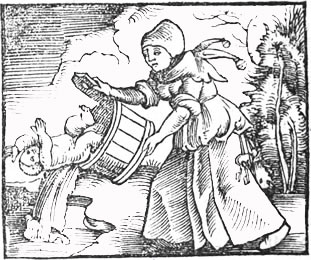Schüttet das Kind mit dem Bade aus
 VERNACULAR. Language. I don’t know about you, but I’ve long been fascinated by these things. The morphing of meaning over time. Dirty words and what makes them dirty. Dialects. How you can be saying one thing and I’m hearing something else. I think that fascination has been with me since childhood, certainly from the time I was a teenager, and might even be traced to a particular incident that took place at the dinner table.
VERNACULAR. Language. I don’t know about you, but I’ve long been fascinated by these things. The morphing of meaning over time. Dirty words and what makes them dirty. Dialects. How you can be saying one thing and I’m hearing something else. I think that fascination has been with me since childhood, certainly from the time I was a teenager, and might even be traced to a particular incident that took place at the dinner table.
I’d read a tiny little item in the Garland Daily News I thought might be more interesting than the sound of chewing. I can almost recite it to this day:
“Scientists have concluded that the ‘fruit of the tree of knowledge of good and evil’ referred to in the Old Testament story of the Garden of Eden might have actually been an apricot.”
So I mentioned it at the table. I said something like, “I just read that scientists say the fruit of the tree of knowledge of good and evil in the Garden of Eden was actually an apricot.”
At that particular point in time, my dad had not yet become very religious. That was still to come. But he had to draw the line somewhere, and to him I’d just crossed it. James Frank Starr put down his fork, looked at me, and said, “Jimmy, if the bible says it was an apple, it was an apple.”
It was one of those seminal moments of youth, when I realized it was wiser, if I might paraphrase the words of Abraham Lincoln, to remain silent and let others think me a fool, then to open my mouth and have some of my teeth knocked out. I’m kidding as my dad would never have hit me. There. But I recall that interlude of enforced thoughtfulness and think that observing the arbitrary give-and-take of language and truth in our interchange may have in part contributed to whatever has made me a writer.
But you wanted to know about the picture, of the lady throwing the baby out with the bathwater. I only put it there to trick you into reading the story about my dad. And also because it can be found on a British language website I enjoy, phrases.org.uk, with an article explaining the derivations of the expression. And also because the article reveals how, although it dates to a sixteenth-century German parable, among the first appearances in English was in a nineteenth-century essay by Thomas Carlyle, in which he likens the dirty bathwater to slavery and the child to the negro slave.
By the standards of the day, the words of the Scottish philosopher apparently seemed noble, humanitarian, and anti-slavery. But he was actually arguing that the institution of slavery should be replaced by life-long paid servitude for the black man.
Switcheroo.